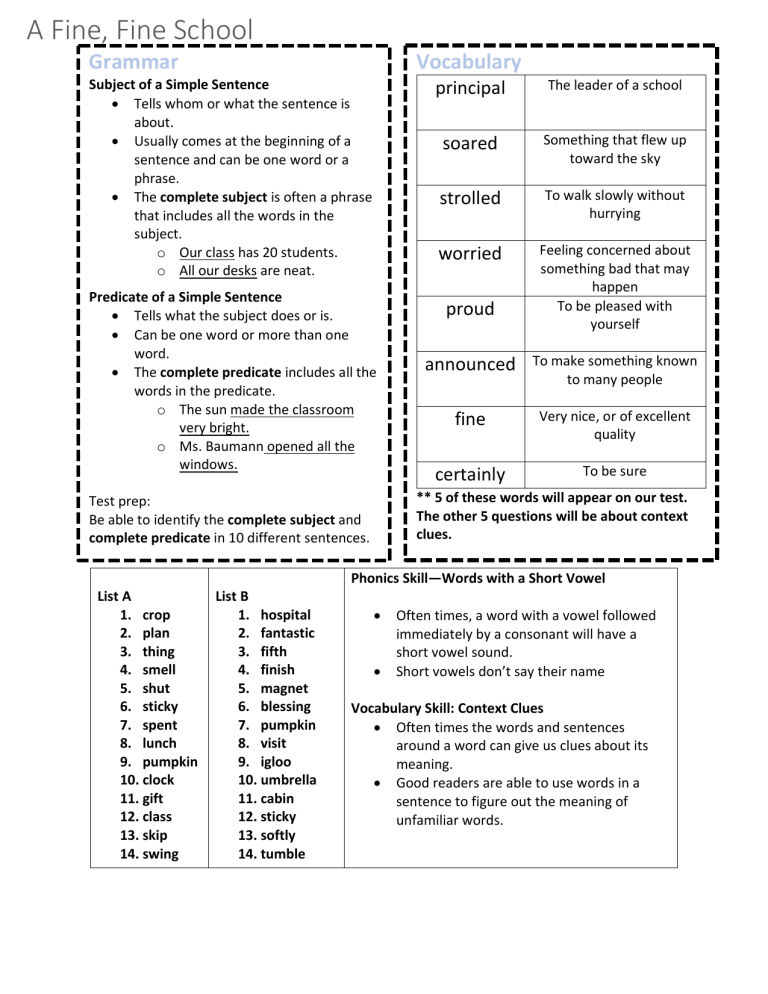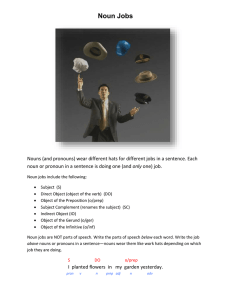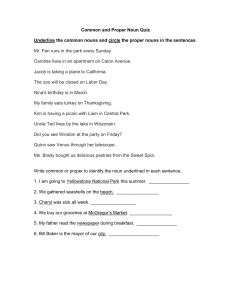
A Fine, Fine School Vocabulary Grammar Subject of a Simple Sentence • Tells whom or what the sentence is about. • Usually comes at the beginning of a sentence and can be one word or a phrase. • The complete subject is often a phrase that includes all the words in the subject. o Our class has 20 students. o All our desks are neat. Predicate of a Simple Sentence • Tells what the subject does or is. • Can be one word or more than one word. • The complete predicate includes all the words in the predicate. o The sun made the classroom very bright. o Ms. Baumann opened all the windows. List B 1. hospital 2. fantastic 3. fifth 4. finish 5. magnet 6. blessing 7. pumpkin 8. visit 9. igloo 10. umbrella 11. cabin 12. sticky 13. softly 14. tumble The leader of a school soared Something that flew up toward the sky strolled To walk slowly without hurrying worried Feeling concerned about something bad that may happen To be pleased with yourself proud announced To make something known to many people fine Very nice, or of excellent quality certainly To be sure ** 5 of these words will appear on our test. The other 5 questions will be about context clues. Test prep: Be able to identify the complete subject and complete predicate in 10 different sentences. List A 1. crop 2. plan 3. thing 4. smell 5. shut 6. sticky 7. spent 8. lunch 9. pumpkin 10. clock 11. gift 12. class 13. skip 14. swing principal Phonics Skill—Words with a Short Vowel • • Often times, a word with a vowel followed immediately by a consonant will have a short vowel sound. Short vowels don’t say their name Vocabulary Skill: Context Clues • Often times the words and sentences around a word can give us clues about its meaning. • Good readers are able to use words in a sentence to figure out the meaning of unfamiliar words. Comprehension Skill: Story Structure Setting: Where the story takes place Characters: The people in the story. We often only know information about the main characters in the story. Plot: The events that happen in the story. The events that happen in the plot are often times responses to how the characters in the story respond to situations and what they say and do. We often break apart the plot into beginning, middle and end. Comprehension Skill: Analyze Illustrations Illustrations: Pictures or drawings that show events in the story. Illustrations helps us know more about what is happening in the story. Often times, we can determine mood and feelings of characters by examining the illustrations. Story Structure in A Fine, Fine School Setting: Characters: • Tillie’s house • Mr. Keene, the principal • School • Tillie • Tillie’s little brother Plot: Beginning: • Mr. Keene tells people at school that it is a fine, fine school. • Tillie plays with her brother and dog on the weekends • Mr. Keene decides school will be open on Saturdays Middle: • The teachers and students do not want to go to school on Saturday, but they don’t know how to tell Mr. Keene that. • The next month, Mr. Keene tells everyone that there will know be school Sunday! • The teachers and students do not and students do not want to go to school every day. End: • Mr. Keene sees that the students and teachers are unhappy so he decided to cancel his decision to have school on Saturday and Sunday. • The children and teachers cheer with joy! Comprehension Test Prep: 1. What does Tillie do on the weekend before Mr. Keene asked teachers and students to come to school on Saturday and Sunday? 2. Why don’t the teachers and students tell Mr. Keene how they feel about his idea of adding more school? 3. Be able to analyze pictures throughout the story. 4. What is Tillie’s problem at school, and how is it solved? The Trial of Cardigan Jones Grammar Kinds of Sentences Vocabulary Statements: • Ends with a period • Also called a declarative sentence. o We go to school Monday-Friday. Questions: • Ends with a question mark • Also called an interrogative sentence. o What is the name of your favorite book? Commands: • Ends with a period • A sentence that tells someone to do something. • Also called an imperative sentence. o Wash your hands before eating. Exclamation: • Ends with an exclamation mark • Shows strong feeling such as excitement, surprise or fear • Also called exclamatory sentences. o I am so happy! Test prep: Be able to identify 10 different types of sentences. List A: List B: 1. spoke 1. believe 2. mile 2. surprise 3. save 3. thrive 4. excuse 4. excuse 5. cone 5. breeze 6. invite 6. phone 7. cube 7. scene 8. price 8. froze 9. erase 9. invite 10. ripe 10. quote 11. broke 11. chrome 12. flame 12. costume 13. life 13. grade 14. rule 14. broke Trial Jury Convince A meeting in court to decide if someone has broken the law. The group of people who make the decision in a trial. To believe or agree to do something Guilty A person who did something wrong. Pointed Honest To use a finger or another object to show where something was. Truthful Murmur To speak very softly Stand The place where a witness in a trial sits while being questioned. ** 5 of these words will appear on our test. The other 5 questions will be about using a dictionary. Phonics Skill: Words with the VCe pattern • Often when you see a word with a vowel, consonant and then ending with an e, the vowel will say its name. • Vowels that “say their name” are called long vowels. Vocabulary Skill: Using a Dictionary • A dictionary contains an alphabetical listing of words along with their meaning, pronunciations, and parts of speech. • Be able to look at a dictionary excerpt and find the correct definition for a word. Comprehension Skill: Conclusion • Draw a conclusion as you read • They are smart guesses about something the author does not say directly. • To draw a conclusion, look for text evidence and background knowledge. • Comprehension Skill: Author’s Word Choice • An author uses words to create a picture in a reader’s mind. Author’s usually use precise words so that a reader can see and hear the events and characters in a story. A reader can use a chart like the one below to draw conclusions about what they read: Comprehension Test Prep: 1. What did Cardigan Jones do to make everyone believe he stole the pie? 2. Which word from the story does the author use to show Cardigan is upset during the trial? 3. How do you think the animals will respond the next time there is a trial? 4. How would you describe the judge? 5. What conclusion can you draw about the animals at the end of the story? Destiny’s Gift Grammar Simple Sentences • Tells one complete thought o The kids met at the bookstore. Compound Sentences • Tells two complete thoughts joined by a coordinating conjunction. o The children handed out fliers, and their parents carried signs. Coordinating Conjunctions • And joins two similar ideas • But joins two different ideas • Or joins two possible ideas • So shows that the second idea happens because of the first idea Run-On Sentences • Two or more simple sentences that run together without the use of a coordinating conjunction. o Moose are good swimmers they are fast runners. Test Prep: 1. Be able to combine two simple sentences into one compound sentence by choosing the proper coordinating conjunction. Vocabulary Afford To be able to pay for something Customers People who buy things in a store Contacted To get in touch Raise To collect money, often by having an event Earn To receive money, praise or respect from others Figure To decide or solve Block The section of a street between two other streets Stretching out or Spreading expanding. ** 5 of these words will appear on our test. The other 5 questions will be about antonyms. List A: List B: 1. lay 1. yesterday Phonics Skill: Common vowel pairs ai, ay, ee, ea 2. real 2. explain • ai and ay both make the long a sound in a word. 3. trail 3. reason • ee and ea both make the long e sound in a word. 4. sweet 4. layer • When separating a word into sounds, say these 5. today 5. sweeten common vowel sounds together rather than 6. dream 6. leader pronouncing both vowels. 7. seem 7. always 8. tea 8. afraid Vocabulary Skill: 9. treat 9. leave • Antonyms: Words which have the opposite or 10. afraid 10. player very different meanings. 11. leave 11. queen • Examples: first and last; all and none; up and 12. bait 12. bait down; right and left. 13. screen 13. faith 14. speed 14. degree Comprehension Skill: Understanding Characters As we read, we look for traits, motivations, and feelings in the characters we read about. 1. Feelings are a person’s emotions about something or someone. 2. Traits are a person’s qualities. 3. Motivations are the reasons a person acts a certain way. We can use text evidence in a story to help us better understand a character. Comprehension Skill: Story Message Authors write because they want to tell readers something. They may have a message or lesson to deliver, but they tell it through a story. Readers should think, “What is the author saying about real life in this story?” If we look at this chart below, what conclusion can you draw about Destiny? Comprehension Test Prep: 1. What is something Mrs. Wade does to show how she feels about Destiny? 2. What lesson do the people in the neighborhood want Mrs. Wade’s landlord to learn? 3. What lesson can you as a reader learn from Destiny’s Gift? 4. How would you describe Mrs. Wade? Pop’s Bridge Grammar Nouns • A word that names a person, place, or a thing. • The noun that is doing something in a sentence is the subject. Common Nouns • Name any person, place, or thing. • Do no capitalize common nouns. o He learned about a bridge. Proper Nouns • Names a specific person, place or thing. • Capitalize proper nouns. • May have more than one word. People’s titles and important words in titles of books are capitalized proper nouns. o Henry learns about the Brooklyn Bridge. Test Prep: • Be able to identify a common or proper noun in a sentence. • Be able to identify the common noun that names a place and a person in a sentence. o I want to go to the moon! o The boy was riding a bike. Vocabulary Crew A group of people doing work Tide The rise and fall of the sea Cling To stick to something or hang on tightly Balancing To keep steady without tipping over Foggy A thick mist or low clouds Disappears Soemthing that passes from sight To extend or spread out Stretch Excitement A feeling of great happiness. ** 5 of these words will appear on our test. The other 5 questions will be about word families. List A: List B: 1. load 1. tomorrow Phonics Skill: Long o 2. open 2. sailboats • Remember, a long vowel says its name. 3. told 3. rainbow • Common pairings for a long o sound are “oa” and “ow” 4. yellow 4. oatmeal • “ow” usually comes at the end of a word. 5. soak 5. throat 6. shadow 6. upload Vocabulary Skill: Word Families 7. foam 7. float • A base word is a word to which endings and prefixes can 8. follow 8. arrow be added. 9. glow 9. throw • A word family is a group of words with a common pattern, 10. sold 10. slowly such as the same base word. 11. window 11. coach • For example: think means to consider something, so 12. coach 12. below rethink, means to consider it again. 13. almost 13. toaster 14. throat 14. goalie Comprehension Skill: Compare and Contrast • • Compare: Deciding how people and things are alike. Contrast: Deciding how people and things are different In Pop’s Bridge Robert and Charlie’s dads have similar and different traits, motivations and feelings. You can compare and contrast how the two dads are similar and different. You can use a chart like this: Comprehension Skill: Story Structure • • • • Setting: Where and when a story takes place Characters: The people in a story Plot: The important events that occur in a story. Sequence of Events: The order in which the plot happens. Comprehension Test Prep: 1. How are Robert and Charlie alike? 2. How is Robert’s dad different than Charlie’s? 3. How does Robert change by the end of the story? 4. When does Robert know his father loves the bridge? 5. How does Robert feel whenever there is fog covering the bridge? Roberto Clemente: Pride of the Pittsburgh Pirates Grammar Singular and Plural Nouns Singular Nouns: a noun that names only one person, place, or thing. Plural Nouns: a noun that names more than one person, place, or thing. • In most cases, add –s to a singular noun to make it plural. o Dog à dogs o folder à folders • If a word end in a S, SH, CH, or X, add an –es to make the noun plural. o Bus à buses o Box à boxes o Church à churches Test prep: • Practice identifying nouns in sentences. • Be able to correctly identify how to turn a singular noun into a plural noun. Vocabulary Stands Seats from which people watch a game Fans People who enjoy watching a certain activity and supporting people who participate To make or earn points in a game Score League A group of teams that play against one another Slammed Hit or closed very hard Polish To make something smooth and bright by rubbing A person’s special way of doing something Said in a particular way Style Pronounced ** 5 of these words will appear on our test. The other 5 questions will be about the –mis prefix. List A: List B: 1. slight 1. silent Phonics Skill: Long i 2. mild 2. frightening • Remember, a long vowel says its name. 3. sight 3. midnight • Common pairings for a long i sound are “igh” and “ie” 4. pie 4. grind 5. mind 5. flight Vocabulary Skill: Prefix -mis 6. tie 6. tonight • We you add –mis to the beginning of a word, it is implying 7. pilot 7. icicle that something is wrong or incorrect. 8. might 8. polite For Example: 9. lie 9. cried • If I misspell a word, I have spelled it wrong. 10. tight 10. remind • It I put the wrong label on my notebook, I have 11. blind 11. sigh mislabeled it. 12. fight 12. untie • If I miscalculate a math problem, I have done the problem 13. die 13. climb incorrectly. 14. midnight 14. replies Comprehension Skill: Cause and Effect • • • • • Cause: an event that makes something else happen. Effect: an event that happens because of an earlier action. Signal Words: Words that indicate a cause and its effect. Some common signal words are so, if, then, because, and since. Comprehension Skill: Literal and Nonliteral Meanings Literal meaning: the exact meaning of a word or phrase o The literal meaning of the word fever is to have a high body temperature. Nonliteral meaning: A meaning that differs from the exact meaning of a word or phrase. o As a boy, Roberto Clemente had a fever to play and win baseball. o In this context fever means a passion or great excitement. Test Prep: 1. What did Roberto use for baseballs when he was growing up? 2. What was the effect of using bottle caps as baseballs for Roverto Clemente? 3. Why did Roberto go to Central America after his last World Series? 4. Why was Pittsburgh so excited for Roberto? 5. What does “a jolt of electricity” mean?


